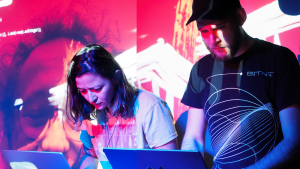Lina Bautista (aka Linalab) is a musician, artist, educator and developer who combines modular synths, DIY electronics and computers to make music and engage audiences in the tech of sound. She is part of Toplap Bcn and Axolot and teaches at several universities in Barcelona.
Contributors 2024
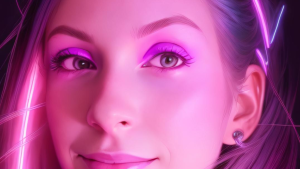
Linda Kronman is a media artist and PhD researcher in a digital humanities project called Machine Vision in Everyday Life at the University of Bergen. Her research on how machine vision is represented in digital art draws on feminist and posthuman-theory. By combining methods from humanities with artistic explorations she engages with the ways art can help us think differently about AI. Since 2010 Linda Kronman and Andreas Zingerle have collaborated as artist duo Kairus exploring the use and abuse of technologies in their art.

Luka Prinčič is a musician, sound designer and media artist. He has been writing music, creating sound art, performing, and manipulating new media in various ways since mid-’90s. He specialises in computer music, elaborated funk beats, immersive soundscapes, incidental music for live arts & video, and digital media experiments.
He performed at festivals like Ars Electronica (Linz), EMAF (Osnabrueck), Netmage (Bologna), MENT (Ljubljana) and Trouble (Brussels), and worked at Ljubljana Digital Media Lab (Ljudmila) and local hackerspace CyberPipe (Ljubljana).

Mariana Marangoni is an artist, researcher, and educator based in London. Through a wide range of media such as installations, web-based experiments and visual poetry, Mariana critically explores the materiality of media and the aesthetics of digital decay. Recent work has been focused on heterogeneous computational paradigms for an increasingly exhausted planet. She is currently a PhD student at the Creative Computing Institute and a Lecturer for the BA Fine Art: Computational Arts programme at the Camberwell College of Arts.
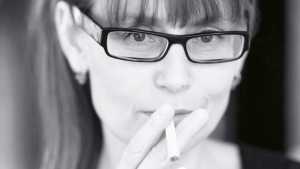
Marina Gržinić is a full professor and principal research associate at the Institute of Philosophy ZRC SAZU, and a full professor at the Academy of Fine Arts Vienna.
Marina Gržinić, photo by Jane Štravs ©

Martin Disley is an artist, software developer and PhD researcher at the Institute for Design Informatics at the University of Edinburgh. His practice-based research is grounded in critical engineer, investigative aesthetics and adversarial design, manifesting the internal contradictions and logical limitations of emerging data technologies in beguiling images, video and sound.

Martin Gius (aka. polymorphic engine) is a musician and computer-scientist based in Vienna. He currently studies in the Master program of Experimental Game Cultures at the University of Applied Arts in Vienna. His main interest lies in the practice of live-coding and using the possibilities live-coding provides to create music collaboratively. At the moment he is also developing a new live-coding language, zwirn.
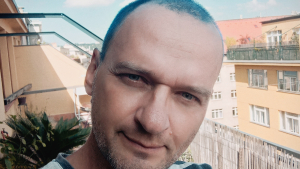
I am moving from the field of audiovisual live performances and experimental film to forest
gardening, building livinglab and back. With a background in information science and coding,
I was among the founders and currently a curator of node9.org digital community server and
online gallery. My practice involves writing on online activism, digital curation or postmediality,
as part of creating networks based on trust in those fields. In the recent projects on the role of
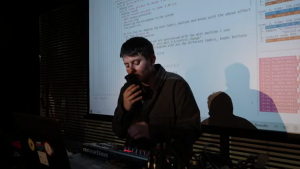
Mitsitron (they/them) is a cultural worker from Greece, based at Rotterdam. They have been shaped by soundscapes and public spaces, austerity and forced categorizations, heartbreaks and conscious relating. Through their practiced research they design processes to queer sound design structures.


